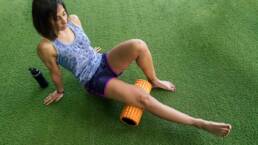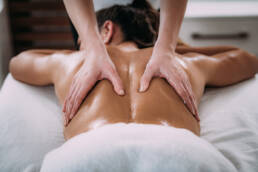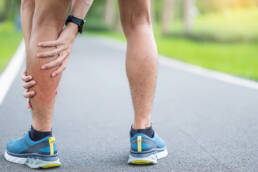As any cyclist knows, achieving peak performance requires more than just rigorous training and a top-notch bike. It involves a holistic approach to health and wellness, where every detail counts. From nutrition and hydration to mental focus, cyclists strive to optimize every aspect of their preparation. However, one often overlooked yet highly effective method for enhancing performance and preventing injuries is sports massage therapy.
At Denver Sports Massage, we understand the unique physical demands placed on cyclists. Our specialized massage therapy services are designed to address the specific issues cyclists face, such as tight hip flexors, IT band syndrome, and lower back pain. By integrating sports massage into your routine, you can unlock new levels of performance, reduce your risk of injury, and ensure faster recovery times.
In this blog, we’ll explore the common issues faced by cyclists, how sports massage therapy can help alleviate these problems, and the overall benefits of regular massage therapy for cyclists looking to achieve their best. Join us as we delve into the world of sports massage and discover how Denver Sports Massage can help you pedal past your limits.
Common Issues Faced by Cyclists
Cycling, while an excellent way to stay fit and competitive, places unique strains on the body. Understanding these common issues is the first step toward addressing them effectively.
Tight Hip Flexors
- Cause: Cyclists spend prolonged periods in a bent-over position, which can cause the hip flexors to tighten and shorten. This issue is exacerbated by repetitive pedaling motions.
- Symptoms: Cyclists with tight hip flexors often experience reduced range of motion, discomfort during rides, and stiffness post-ride. This tightness can also lead to compensatory movements that strain other parts of the body.
- Impact on Performance: Tight hip flexors can limit a cyclist’s power output and efficiency, making it harder to maintain high speeds and endure long rides.
IT Band Syndrome
- Cause: This overuse injury is common among cyclists due to repetitive leg motion and poor bike fit. The iliotibial (IT) band, which runs along the outside of the thigh from the hip to the knee, can become irritated and inflamed.
- Symptoms: Cyclists with IT band syndrome typically experience pain and tenderness on the outside of the knee. This pain often worsens with continued riding and can be debilitating if not addressed.
- Impact on Performance: IT band syndrome can severely hinder a cyclist’s ability to train and compete, often requiring rest and rehabilitation.
Lower Back Pain
- Cause: Poor posture on the bike, weak core muscles, and the constant forward-leaning position can all contribute to lower back pain in cyclists. The lower back bears much of the strain from an aggressive riding posture.
- Symptoms: Cyclists suffering from lower back pain may feel a persistent ache or sharp pains, especially during and after long rides. This discomfort can lead to decreased enjoyment and performance.
- Impact on Performance: Lower back pain reduces overall comfort and efficiency, limiting a cyclist’s ability to perform at their best and potentially causing them to cut rides short.
Understanding these issues is crucial for any cyclist aiming to improve their performance and longevity in the sport. Fortunately, sports massage therapy offers effective solutions to these common problems, allowing cyclists to ride more comfortably and efficiently.
How Sports Massage Therapy Helps Cyclists
Sports massage therapy is a powerful tool in a cyclist’s arsenal, offering targeted treatments that address the specific issues faced by riders. Here’s how it helps:
Alleviating Tight Hip Flexors
- Techniques Used: Deep tissue massage and stretching are commonly employed to address tight hip flexors. Deep tissue massage targets the deeper layers of muscle and connective tissue, breaking down adhesions and scar tissue that can contribute to tightness. Stretching helps to lengthen the muscles, improving flexibility.
- Benefits: By releasing tension and increasing flexibility, massage therapy helps to restore the natural range of motion in the hips. This not only reduces pain and discomfort but also allows for more efficient and powerful pedaling, which is crucial for maintaining speed and endurance during long rides.
Managing IT Band Syndrome
- Techniques Used: Myofascial release and targeted massage are effective for treating IT band syndrome. Myofascial release involves applying sustained pressure to the connective tissues, helping to release tension and improve mobility. Targeted massage focuses on the IT band and surrounding muscles to reduce inflammation and discomfort.
- Benefits: These techniques help to alleviate the pain and stiffness associated with IT band syndrome. Regular sessions can prevent the recurrence of this condition, allowing cyclists to continue training and competing without interruption. Improved tissue flexibility and reduced inflammation contribute to smoother, pain-free rides.
Relieving Lower Back Pain
- Techniques Used: Trigger point therapy and muscle relaxation techniques are often used to address lower back pain. Trigger point therapy targets specific areas of muscle tension, or “knots,” that can cause referred pain in the lower back. Muscle relaxation techniques focus on relieving general muscle tension and improving circulation.
- Benefits: By reducing muscle tension and improving posture, massage therapy helps to alleviate lower back pain. Strengthening supporting muscles and enhancing flexibility around the spine allows cyclists to maintain a proper riding posture, reducing strain on the lower back and enhancing overall comfort and performance.
Enhancing Cycling Performance with Sports Massage Therapy
Beyond addressing specific issues, sports massage therapy offers broader benefits that can enhance a cyclist’s overall performance.
Increased Flexibility and Range of Motion
- Explanation: Regular massage therapy keeps muscles supple and joints flexible, essential for efficient movement and power transfer.
- Impact: Enhanced flexibility and range of motion allow for more effective pedaling and better bike handling, crucial for navigating varied terrains and maintaining high speeds.
Enhanced Muscle Recovery and Reduced Fatigue
- Explanation: Massage improves blood flow, which aids in the removal of lactic acid and other metabolic waste products that accumulate during intense exercise.
- Impact: Faster recovery times mean cyclists can train more frequently and intensely without the prolonged downtime associated with muscle soreness and fatigue.
Injury Prevention
- Explanation: Regular massage therapy can identify and address muscle imbalances and areas of tension before they develop into more serious injuries.
- Impact: By preventing injuries, cyclists can maintain consistent training schedules and avoid the disruptions and setbacks that come with being sidelined by pain or injury.
Sports massage therapy is not just a luxury; it’s an essential component of a cyclist’s training regimen. By incorporating regular massage sessions, cyclists can improve their performance, prevent injuries, and recover more effectively. At Denver Sports Massage, our experienced therapists are dedicated to helping you achieve and maintain peak performance.
Enhancing Cycling Performance with Sports Massage Therapy
Beyond addressing specific issues like tight hip flexors, IT band syndrome, and lower back pain, sports massage therapy offers a range of benefits that can significantly enhance a cyclist’s overall performance.
Increased Flexibility and Range of Motion
- Explanation: Flexibility and range of motion are critical for efficient cycling. Regular sports massage therapy works to keep muscles supple and joints flexible, which is essential for smooth, powerful pedaling and optimal body positioning.
- Impact: Enhanced flexibility allows cyclists to achieve a more aerodynamic posture and execute more efficient pedaling mechanics. This translates to better handling of the bike, increased power output, and the ability to sustain higher speeds over longer distances. Improved range of motion also reduces the risk of injuries caused by muscle stiffness and joint immobility.
Enhanced Muscle Recovery and Reduced Fatigue
- Explanation: Intense cycling sessions lead to the accumulation of lactic acid and other metabolic waste products in the muscles, which can cause soreness and fatigue. Sports massage therapy improves blood circulation, facilitating the removal of these waste products and delivering oxygen and nutrients to the muscles.
- Impact: Faster muscle recovery means cyclists can return to training sooner and with less discomfort. Reduced muscle fatigue allows for more effective and frequent training sessions, leading to greater improvements in strength, endurance, and overall performance. This also means cyclists can perform better in competitions and recover quickly afterwards.
Injury Prevention
- Explanation: Sports massage therapy can identify and address muscle imbalances, tightness, and areas of tension that may not yet be causing pain but have the potential to lead to injuries. Regular massage sessions help to maintain muscle health and prevent the build-up of tension and adhesions.
- Impact: Preventing injuries before they occur is crucial for maintaining consistent training and avoiding disruptions caused by injury-related downtime. Cyclists who integrate regular massage therapy into their routine are less likely to suffer from common overuse injuries, allowing them to train more consistently and effectively.
Improved Mental Well-being
- Explanation: Physical performance is closely linked to mental state. Sports massage therapy can also have a relaxing and stress-reducing effect, which is beneficial for overall mental health.
- Impact: Reduced stress and improved relaxation contribute to better focus and mental clarity, which are essential for both training and competition. Cyclists who are mentally sharp and relaxed are more likely to make strategic decisions during races and maintain the motivation needed for rigorous training schedules.
At Denver Sports Massage, we specialize in providing tailored sports massage therapy for cyclists. Our therapists understand the unique demands of cycling and are skilled in techniques that enhance flexibility, promote faster recovery, prevent injuries, and improve overall mental well-being. Whether you are a competitive racer or a recreational cyclist, integrating sports massage into your training routine can help you unlock your full potential and achieve your cycling goals.
Tips for Cyclists in Denver
Incorporating sports massage therapy into your cycling routine is a key step towards achieving peak performance. Here are some practical tips for cyclists in the Denver area to make the most of this valuable resource:
Frequency of Massage Therapy
- Recommendation: To reap the full benefits of sports massage therapy, regular sessions are essential. For active cyclists, scheduling a massage every 1-2 weeks is ideal. This frequency helps maintain muscle flexibility, promotes ongoing recovery, and prevents the build-up of tension and adhesions.
- Consideration: During periods of intense training or competition, you might need more frequent sessions. Conversely, during off-season or lower-intensity periods, you might scale back to once a month.
Combining Massage with Other Recovery Strategies
- Hydration: Proper hydration is crucial for muscle recovery. Drinking plenty of water before and after your massage helps flush out toxins and aids in the healing process.
- Nutrition: Fuel your body with a balanced diet rich in proteins, healthy fats, and carbohydrates to support muscle repair and energy levels.
- Rest: Adequate sleep and rest days are essential for recovery. Listen to your body and give it the time it needs to repair and strengthen.
Choosing the Right Massage Therapist
- Criteria: Look for a therapist who specializes in sports massage and has experience working with cyclists. They should understand the specific muscle groups and issues that cyclists commonly face.
- Credentials: Check the therapist’s qualifications, certifications, and reviews. A reputable sports massage therapist will have the necessary training and a proven track record of helping athletes improve their performance.
- Personal Fit: It’s important to feel comfortable with your therapist. A good therapist will listen to your concerns, tailor their approach to your needs, and provide a comfortable and professional environment.
Integrating Massage with Training
- Timing: Schedule your massage sessions around your training schedule. Post-training or post-competition massages can help speed up recovery, while pre-event massages can prepare your muscles for optimal performance.
- Communication: Keep your massage therapist informed about your training load, upcoming events, and any specific areas of concern. This allows them to adjust their techniques and focus areas to best support your needs.
Leveraging Local Resources
- Denver’s Cycling Community: Engage with the local cycling community in Denver. Many cycling clubs and groups can provide recommendations for the best sports massage therapists and other supportive services.
- Events and Workshops: Attend local events and workshops related to cycling and sports therapy. These can offer valuable insights and networking opportunities to enhance your training and recovery strategies.
Denver Sports Massage is dedicated to supporting local cyclists with expert sports massage therapy tailored to their unique needs. Our team understands the demands of cycling and is here to help you maximize your performance, prevent injuries, and recover efficiently. By integrating our specialized massage therapy into your routine, you can ride stronger, faster, and longer.
Conclusion
Cycling is a demanding sport that requires not only physical strength and endurance but also strategic recovery and injury prevention measures. Sports massage therapy plays a crucial role in helping cyclists achieve and maintain peak performance. By addressing common issues such as tight hip flexors, IT band syndrome, and lower back pain, massage therapy enhances flexibility, promotes faster recovery, and prevents injuries.
At Denver Sports Massage, we specialize in providing tailored sports massage therapy designed to meet the unique needs of cyclists. Our experienced therapists are dedicated to helping you unlock your full potential, whether you’re training for your next big race or simply looking to improve your overall riding experience.
Integrating regular massage sessions into your routine, combined with proper hydration, nutrition, and rest, will ensure that you stay at the top of your game. Additionally, choosing a skilled and knowledgeable massage therapist who understands the demands of cycling is essential for achieving the best results.
By leveraging the expertise of Denver Sports Massage and following the tips provided, you can enjoy a smoother, more powerful ride, free from the common aches and pains that often plague cyclists. Don’t let tight muscles and preventable injuries hold you back. Take the proactive step of incorporating sports massage therapy into your training regimen and experience the transformative benefits it offers.
Ready to enhance your cycling performance and recovery? Book an appointment with Denver Sports Massage today and start your journey towards peak performance. Visit our website or give us a call to schedule your session. Ride stronger, recover faster, and achieve your cycling goals with the support of Denver Sports Massage. Contact us today.

With unique treatment plans tailored specifically to each individual, our goal is to offer a comprehensive approach to healing and reducing pain. We pride ourselves on taking a holistic approach to massage therapy for pain and are committed to providing the highest quality care. If you’re looking for a massage therapist in Denver to help with pain, schedule an appointment today!
Like this article? Spread the word!
Related Posts
July 11, 2024
Unlocking Peak Performance: The Role of Sports Massage Therapy for Youth Sports
Unlock peak performance for youth athletes with customized sports massage therapy at…
July 8, 2024
Enhance Your Golf Game with Massage Therapy
Discover how massage therapy at Denver Sports Massage can enhance your golf performance.…
June 19, 2024
Unlocking Peak Performance: The Role of Sports Massage Therapy for Triathletes
Discover how sports massage therapy optimizes training, enhances flexibility, and reduces…





